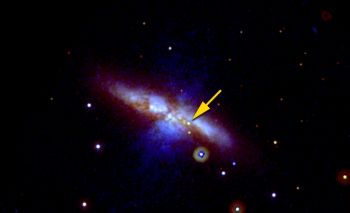 An exceptionally close stellar explosion discovered on Jan. 21 has become the focus of observatories around and above the globe, including several NASA spacecraft. The blast, designated SN 2014J, occurred in the galaxy M82 and lies only about 12 million light-years away. This makes it the nearest optical supernova in two decades and potentially the closest type Ia supernova to occur during the life of currently operating space missions.
An exceptionally close stellar explosion discovered on Jan. 21 has become the focus of observatories around and above the globe, including several NASA spacecraft. The blast, designated SN 2014J, occurred in the galaxy M82 and lies only about 12 million light-years away. This makes it the nearest optical supernova in two decades and potentially the closest type Ia supernova to occur during the life of currently operating space missions.
To make the most of the event, astronomers have planned observations with the NASA/ESA Hubble Space Telescope and NASA's Chandra X-ray Observatory, Nuclear Spectroscopic Telescope Array (NuSTAR), Fermi Gamma-ray Space Telescope, and Swift missions.
As befits its moniker, Swift was the first to take a look. On Jan. 22, just a day after the explosion was discovered, Swift's Ultraviolet/Optical Telescope (UVOT) captured the supernova and its host galaxy.

